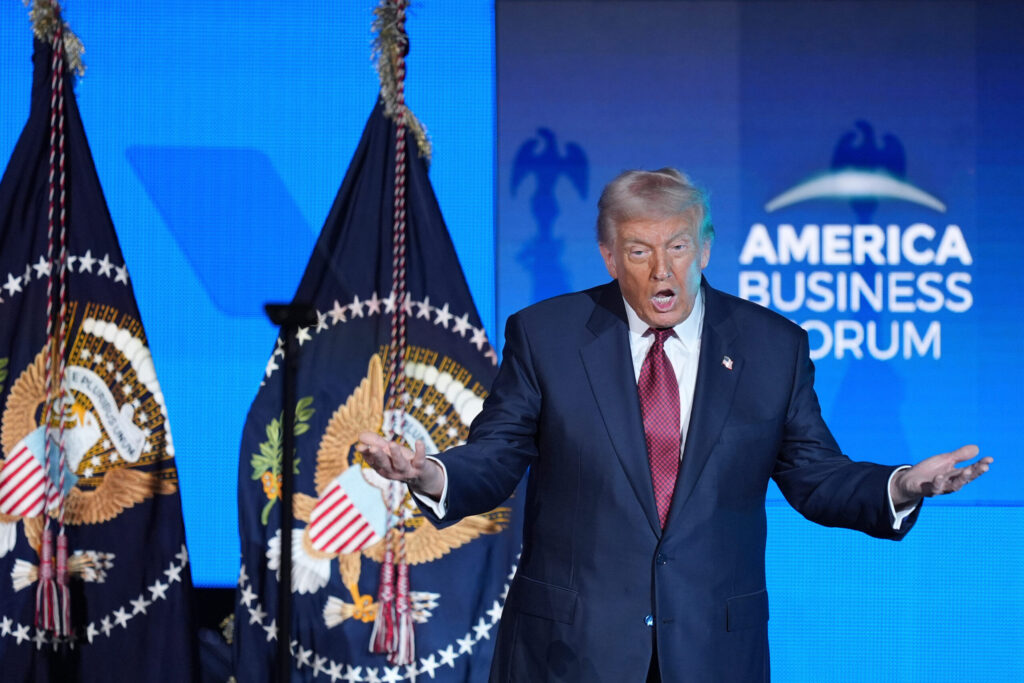Ukraine crisis splits Congress
The growing threat that Russia may invade Ukraine has Congress scrambling to respond, but lawmakers are at odds over how the United States should get involved.
While some Republicans are calling on the Biden administration to send U.S. troops to the region in order to deter Russian President Vladimir Putin from invading Ukraine, others are wary or downright opposed to the U.S. devoting lives and resources to another overseas conflict.
The split comes as President Joe Biden has announced that 8,500 U.S. troops are on alert for deployment to the region in order to back up NATO forces. Biden said U.S. forces won’t enter Ukraine but emphasized that a reaction to a Russian invasion of the country would be swift and severe.
“There will be enormous consequences if he were to go in and invade, as he could, the entire country, or a lot less than that, for Russia,” Biden told reporters Tuesday night. “Not only in terms of economic consequences and political consequences, but there’ll be enormous consequences worldwide.”
BLINKEN WARNS US CIVILIANS COULD BE CAUGHT IN RUSSIA-UKRAINE ‘CONFLICT ZONE’
Many Republicans say Biden should send troops to the region immediately to send Putin a message.
In an interview with Punchbowl News airing on CSPAN, Sen. Todd Young, an Indiana Republican, said Biden should send troops to Eastern Europe “without delay.”
But others in the GOP aren’t eager for another deployment of U.S. soldiers overseas.
Some Republicans are arguing that the U.S. should stay out of the brewing conflict, pointing to the recent and disastrous withdrawal from the two-decade war in Afghanistan that left thousands dead and tens of thousands of veterans injured.
“To be clear, what is happening in Russia is concerning,” Rep. Paul Gosar, an Arizona Republican, wrote in a newsletter. “But it is a problem for Russia, the Ukraine, and eastern Europe. Let me also be perfectly clear: not one American soldier should be shipped across the world to fight to protect the Russian-Ukrainian border. Not one American soldier should die there and not one American bullet should be fired there.”
The split is not limited to the GOP.
Democrats are also at odds over the U.S. response, and few endorse the idea of another conflict abroad.
Democrats ran successfully to retake the House majority in 2006 in part on their opposition to the wars in Afghanistan and Iraq and have since remained almost uniformly opposed to engaging in new military conflicts.
But the Ukraine crisis comes at a pivotal political moment for both Biden and Democrats struggling in the polls after much of their agenda stalled out due to intraparty divisions.
Biden has dropped in the polls, with only one-third approving of the job he’s doing, and Democrats know voters are watching to see how he and the party handle what could be one of the biggest international security crises in years.
“If he were to move in with all those forces, it’d be the largest invasion since World War II,” Biden told reporters Tuesday night. “It would change the world.”
On the House side, Speaker Nancy Pelosi is preparing to advance a bill that would sanction Russia and Vladimir Putin and other oligarchs, impose sanctions on the Nord Stream 2 pipeline supplying gas to Germany, expedite “security assistance” to Ukraine, and block all Russian debt transactions, among other provisions.
It matches a similar measure in the Senate. It would provide Ukraine with a half-billion in funding to bolster Ukraine’s security.
“This legislation would impose significant consequences on Russia, both financially and otherwise, and Congress stands ready to act should President Putin continue to pursue its provocative military buildup on Ukraine’s borders,” Foreign Affairs Committee Chairman Gregory Meeks, a New York Democrat, said.
Meeks said he planned to move the bill “expeditiously,” and according to some Democratic aides, Pelosi is going to fast-track the bill for consideration in the House as early as next week. It’s too fast for some Democrats.
The Intercept reported that some Democratic aides are unhappy with the fast pace of congressional action that would entangle the U.S. with the Ukraine conflict.
“This is how the space for nonmilitary options gets slowly closed off in Washington, without any real debate,” one of the sources, a senior Democratic aide who asked not to be identified, told the Intercept.
Republicans in December introduced their own Ukraine measure that would provide $450 million in security aid, “provide lethal assistance” to the country, and sanction Russia, including the Nord Stream 2 pipeline.
Republicans have yet to endorse the Ukraine measure written by Democrats, but it may not pass without their help.
In the Senate, Democrats will need at least 10 Republicans to advance legislation, which means the sanctions measure will likely have to include tougher provisions in order to win over some GOP lawmakers, such as designating Russia as a state sponsor of terrorism and providing Ukraine more lethal aid.
House Democrats may split thanks to a significant anti-war faction who might not be willing to pass legislation that even tangentially involves U.S. troops in another conflict abroad.
On Tuesday, top members of the House liberal faction published an op-ed in Foreign Policy, touting a new resolution aimed at “international cooperation, diplomacy development, and peacebuilding – not bombs,” to confront the greatest security challenges.
The resolution is authored by Reps. Pramila Jayapal of Washington state, who heads the House Progressive Caucus, and Barbara Lee of California. It calls for slashing the defense budget, limiting arms sales to some countries, and “ending the collective punishment of entire nations through broad-based sanctions and holding the United States accountable to international law.”
CLICK HERE TO READ MORE FROM THE WASHINGTON EXAMINER
Neither Jayapal nor Lee has indicated whether they’ll vote for the Russian sanctions legislation that Pelosi aims to bring to the House floor.
Pelosi has not publicly indicated when she might call up the bill for a vote. Congress is out of session this week but returns Feb. 4.
“There’s not been any final determination on floor timing,” a leadership aide told the Washington Examiner.
Original Location: Ukraine crisis splits Congress
Washington Examiner Videos













